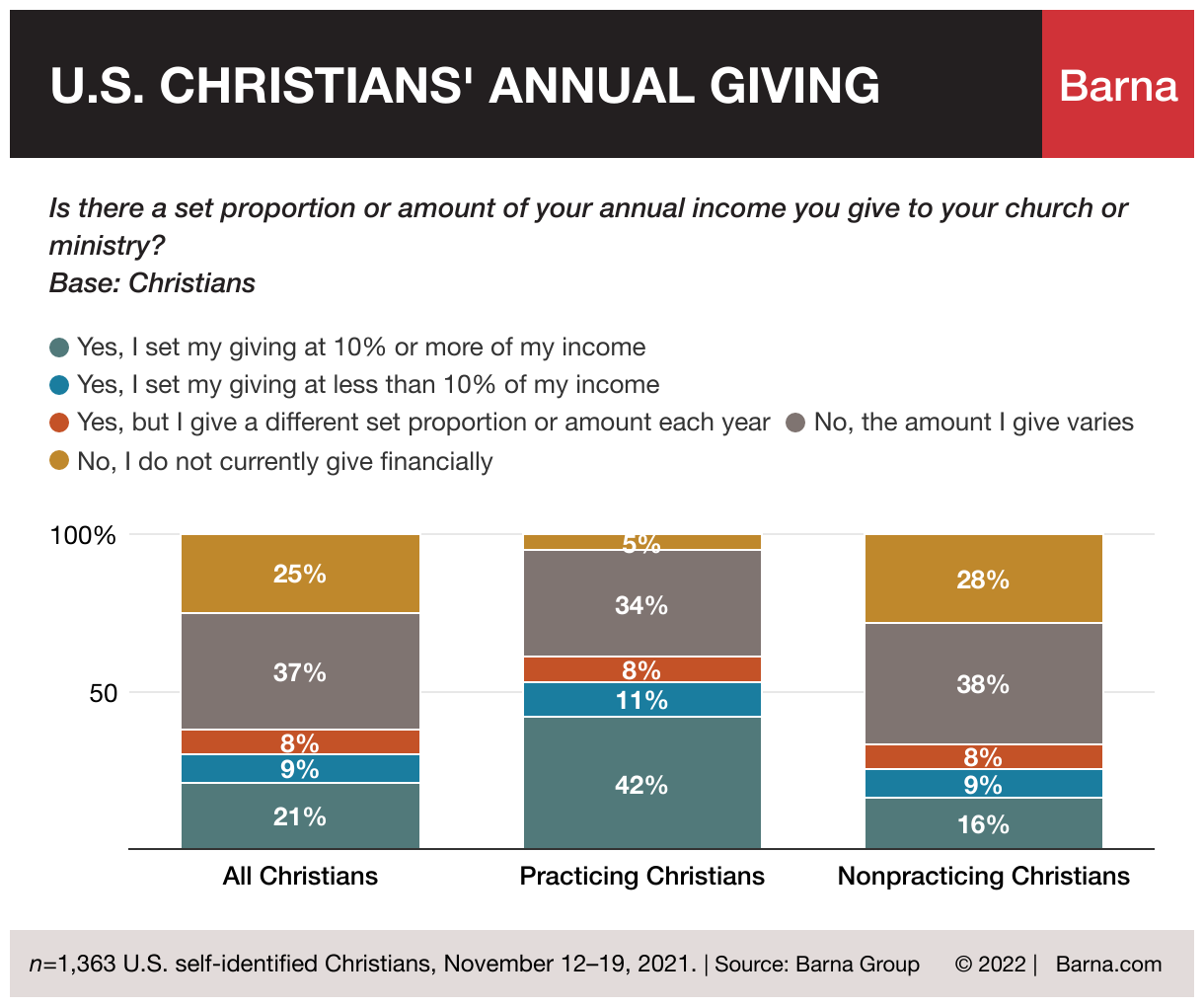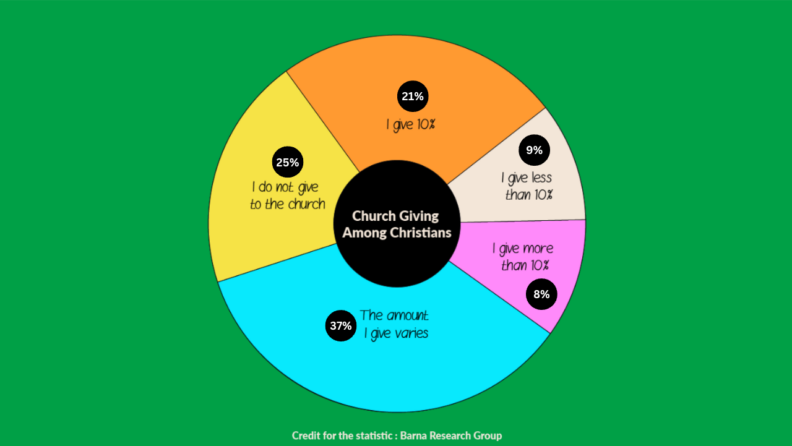What percentage of Christians tithe? 40% - according to the Barna Group’s survey of US Christians in 2021. Further, they found that:
- Two in five practicing Christians tithe at least 10% of their annual income.
- 5% of practicing Christians do not give at all
- 34% say they do not give a set amount
Once you are ready to take a closer at giving within your own church, our article on the 19 Best Church Giving Software To Track Contributions In 2025 will help you get a head start.

Giving at the Local Church Level
When it comes to giving at the local church level, 21% of Christians set their church giving at 10% or more of their income. The survey also found that their giving varies (37%), while one-quarter doesn’t give to their local church at all.
However, practicing Christians are much more likely to set their giving to at least the customary 10 percent tithe (42%), though that means the majority of practicing Christians are still giving less.
According to Nonprofits Source, giving to religious organizations (congregations, denominations, missionary societies, and religious media) remains America’s largest recipient of charitable giving. Overall, about 10 million tithers in the US donate $50 billion yearly to church and non-profits, according to Nonprofits Source in a 2021 report.
Tithing Varies by Denomination
A recent study by Lifeway Research found that more than 3 in 4 American Protestants who attend church see tithing as a biblical command. Those with evangelical beliefs are more likely than those without evangelical beliefs to tithe (39% versus 25%). They also found that about half (51%) give 10% or more of their income to the church they attend.
A number of church-related factors play a role in a person’s likelihood of giving to their church, the study found.
For example, Baptist (40%), Presbyterian/Reformed (34%) and non-denominational (34%) churchgoers are more likely to tithe 10% of their income than Lutheran (19%) and Methodist (12%) churchgoers, according to Lifeway’s findings.
Lifeway also found that most church goers who give use physical methods like cash or check (62%), versus electronic methods like online giving through the church website, or automated giving (35%).
Church Focus: New Life Fellowship
Ross Gilbert, one of the other pastors on the pastoral team at my church (New Life Fellowship in Ontario, Canada) explains the truth about tithing for believers:
Under the New Covenant, we don't tithe, we don't give 10%. We just give. It’s an optional opportunity. We encourage our people to give what Jesus leads them to give. Sometimes that less than 10% - sometimes it's more.
Ross gilbert
As believers in Christ, we have enormous freedom. We have died to the law and are under a new covenant. We are in Christ — and in this covenant, there is freedom: freedom from sin, and freedom to follow our hearts.
As pastors, when we preach on freedom and focus on the heart, everything changes because Jesus changes us:
“It was for freedom that Christ set us free; therefore keep standing firm and do not be subject again to a yoke of slavery.” Galatians 5:1
And again, in Galatians 5:13, we are reminded:
“For you were called to freedom, brothers and sisters; only do not turn your freedom into an opportunity for the flesh, but serve one another through love.”
Is Tithing a Scriptural Requirement?
Tithing means giving a tenth of something. In the Old Testament, it was a mandated part of Jewish life—essentially a tax. Israelites gave three tithes: 10% to support the Levites (Leviticus 27, Deuteronomy 14), another for religious festivals, and a third to care for the poor.
Some argue that because tithing began in the Old Testament, it still applies. Others believe that under the New Covenant, it’s no longer required. Instead of a set amount, Christians are encouraged to give freely and generously as they feel led.
Is Tithing 10% Required in the New Testament?
Those who believe in a 10% command often cite Matthew 23:23 and Hebrews 7:1. In Matthew, Jesus acknowledges tithing but criticizes the Pharisees for ignoring justice, mercy, and faithfulness. His point? Tithing shouldn’t come at the cost of deeper values.
Does the New Testament Emphasize Generosity?
Many believe Christians are called to generous, not compulsory, giving. As 2 Corinthians 9:7 says, we’re to give what we’ve decided in our hearts—not under pressure—for “God loves a cheerful giver.” The focus is less on the rule, more on the heart.
Generosity and biblical stewardship go hand in hand. If you’re a lead pastor realizing tithing isn’t commanded, it’s natural to worry about finances. But instead of pushing a percentage, teach people to trust God and follow the Spirit’s leading. Generosity will follow.
Need help shaping that message? Check out our article on short offering messages for Sundays.
Creating a Culture of Generosity
In Acts 20:35, Paul reminds the Ephesian elders, “It is more blessed to give than to receive.” Focusing less on what percentage of christians in your church tithe, and shifting away from mandated tithing takes time. A few ideas:
- Preach how Jesus modeled generosity
- Focus on heart transformation
- Set an example in how you give
- Teach giving as worship
- Share church needs and goals clearly
- Frame giving as eternal investment
In Matthew 6:21, Jesus said, “Where your treasure is, there your heart will be also.” Help people shift their focus from earthly security to eternal impact.
For more, see our article on increasing church giving.
Subscribe to The Lead Pastor Newsletter
Join our email list for practical insights from other seasoned pastors, who get what it's like to lead in today's church.


